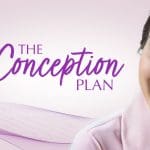Have you been watching the fantastic fertility segment that has been running on ITV’s This Morning over the past four weeks?
The popular show has been following the lives of three couples who are trying to conceive naturally after not being eligible for NHS funded treatment and unable to access for fertility care.
The segment has been orchestrated by This Morning’s wonderful fertility expert, Dr Larisa Corda.
IVF babble had a chat with Dr Larisa to find out all about the project and what she hopes the outcome will be.
How did you come up with the idea?
“This Morning has always recognised and had a strong interest in helping all those who sadly cannot access fertility care and advice, and having been an expert on the show for a few years and through my own experience as a doctor seeing patients struggling to become parents, we both felt it was really important to do something that went even further to help. Aside from the phone-ins we feature throughout the year, the strand we’re currently showing is something that provides advice on every single important pillar crucial to getting pregnant, and a whole lifestyle approach to fertility, which is otherwise very difficult to get across.”
In January This Morning put out a call to its viewers nationwide asking couple to apply. The show was inundated with application and Dr Larisa said it was hard deciding the final three. In the end, the show’s producers chose three UK couples who has struggled with subfertility for a long time, covering both male and female aspects and unable to access fertility care.
Dr Larisa said: “None of the couples, who range in age between their 20s and 30s, have had fertility treatment, with the majority of them having been denied access to care as they do not fit their CCG criteria, either due to weight or having had a child before but they are all trying naturally.”
Tell us about the concept and main pillars you are formulating it around
Eat well. This means looking at your diet as a whole and eliminating foods that have been influenced by hormones, by pesticides, by added preservatives and chemicals and foods that are rich in sugar. All of the above can have serious and harmful effects on your own body but also, as recent epigenetic studies are showing, can be harmful in terms of influencing the development of your baby and their health later in life. What you eat can literally leave a genetic footprint on your children, and also their children, so the effect is transgenerational. This is why your diet is one of the most important aspects of fertile health. You want to be eating food in its cleanest most nutritious state possible, which means buying organic where you can and not over processing or over cooking the ingredients and having a predominantly plant based diet of seasonal fruit and vegetables. Watch all the episodes to see more on diet and also read the tips and recipes I’ve shared on the This Morning app.
Be mindful of the toxic elements influencing our environment, from the water we drink, to the toxins found in cleaning products, to the make-up we put on our skin, to the plastic we use to cover our food in. Whether we absorb the toxins via the gut or the skin, or in some cases inhale around the house, the combined surface area of these organs is massive, and whatever is absorbed can get into our bloodstream and end up being harmful to our hormones that control fertility, as well as the eggs and sperm. The average woman carries over 120 toxins each day, whether it comes from the products she uses on herself, to the air she inhales. Always try and use products in their most natural state because again, much like with food, the repercussions are not just on our own bodies and health, but on our babies health too and their development.
You absolutely need to stop smoking, even e-cigarettes, (though the evidence for this is not yet uncovered) as this can cause damage to the lining of the womb, the eggs and sperm, but also adversely affect the health of your child, not to mention cause all sorts of complications in your pregnancy. You also need to stop any recreational or unnecessary medicinal drugs (consult with your doctor on this beforehand) and minimise alcohol or avoid it altogether. All of these can affect your hormone health, but also lead to developmental problems in the baby. They can also lower libido and cause damage to sperm. The liver is the main organ in the body responsible for processing toxins. If the liver is preoccupied or overburdened with processing these, then it can’t do one of its other major jobs which is to clean up any substances or hormones made in the body that need to be deactivated, otherwise they themselves start to have harmful side effects on your fertility.
Stress reduction and keeping caffeine (which is a stress activator) to a minimum or avoiding altogether is crucial. Though there is no direct association between stress and impaired fertility, there is a wealth of literature to point to the problem of too much stress and activation of the sympathetic or fight or flight response, leading to raised cortisol levels and a permanent state of high alert. This can then start to create an imbalance in your fertility hormones, but in addition, to affect the organs in your body, leading to high blood pressure, problems with sleep, lowered libido and can make us resort to unhealthy lifestyle choices to help us cope with it, such as eating too much sugar for comfort, drinking alcohol or smoking. It becomes a vicious circle. Meditation, yoga, mindfulness, being outdoors in nature, or spending time with close friends can all help. No matter how busy you are, I want you to commit to an hour each day of doing something to relieve stress.
Sleeping well and ensuring your bedroom becomes a sanctuary that is conducive to sleep. This means clearing out the clutter, not using any electrical devices such as TVs and mobile phones before bed time, and ensuring the room is dark enough to allow you to get the crucial seven to eight hours sleep a night that most of us need to be able to function well. Sleep not only helps to combat stress, and improve libido, but it’s vital to processing unnecessary and harmful substances in the body that are made each day, and also boosts immunity, something else that’s really important when it comes to fertility. In addition, good quality sleep can help to keep you lean.
On the theme of immunity, there is growing recognition of the importance of the microbiome within our bodies and how important this is to our overall health as well as fertility. To address this, it may be important to look at eliminating any upsets in this that can be detected through blood tests, but also hair or urine analysis that could also be helpful. This may also show any infections, allergens, parasites or organisms that are creating an imbalance in your immunity, which is important not just in terms of improving your fertility, but also in terms of influencing the baby’s immunity and health. Take a probiotic supplement and consider eating more fermented foods to help. Your gut is often referred to as your second brain, because so many substances made in the brain are also made in the gut, including serotonin.
Exercise to help boost your circulation to your reproductive organs and also to help you maintain a healthy body and mind. Exercise can also help to reduce stress but too much or being over vigorous can do the opposite, so be mindful and aim for that which is realistic and achievable for you. This will also help you to keep weight within the normal range that is vital for fertility and helps to reduce the chance of miscarriage. Ideally, you want to be getting 150 minutes of exercise each week, but if this is too much to start off with, I want you to commit to at least five to ten minutes each day and build on this gradually. Make sure you’re doing a mixture of aerobic (cardiovascular) and anaerobic (resistance) training.
Appreciate the moment you’re in and don’t compare or only focus on the negative of not having yet got your baby. So many couples I see lose confidence over this and start to feel worthless in the process of trying, but what many forget is that the time they spend trying is never wasted. It is always an opportunity to improve your health for the sake of your fertility, but also for the sake of your future baby. This is the time to be making that investment in your physical but also mental wellbeing that will serve you well not just on your baby making journey, but in the future too. Habits you form now will remain with you for the rest of your life, so invest in them wisely.
Have sex often and throughout your cycle. Yes, the fertile window is important in terms of optimising chance of fertilisation and when the egg is exposed to the sperm, but the trouble is that people can become too stressed and focused on just this and sex can become a militaristic operation rather than a pleasure. As long as you’re having sex as often as possible, and recent studies are suggesting that the conventional advice of abstaining for a few days in between is perhaps wrong and that actually sperm performance may improve with regular even daily intercourse, is all the more reason to be active, and this way no matter when ovulation occurs, there will be sperm available to fertilise the egg. So be spontaneous and remember to enjoy sex – orgasm may be helpful in aiding fertilisation too. Having open communication with your partner is vital, as well as nurturing intimacy, and sex is a really important part of that, so do not let it become a chore and instead prioritise spending time with your other half.
Asked what the ultimate aim of the conception plan was, Dr Larisa said it would be a joy to know the couples have had the babies they have so longed for.
“But no matter whether this happens or not, all of them will be investing in their future health and the health of any children they have. It’s about giving them not just the belief and understanding that they can do this, the support and advice that they may not have had otherwise, but also the conviction that ultimately their health and their relationship will both be the stronger having made these changes.
The plan is available to everyone who watches the show, and follows me on my social media platforms, along with my website.
What has been the reaction from viewers?
I’ve had so much lovely feedback from people telling me how much it means to them to be able to get this advice and help that they normally would never get the chance to, and how much it’s helping them. I think it’s also helping to empower people and allow them to realise how much they can actually do to help themselves, whether they’re trying naturally or receiving treatment.
My greatest hope is that each of the couples, and all the viewers, realise how proactive they can be in terms of influencing their fertility, and how much control they can actually have with the right tools and education. Fertility is something that we are never traditionally taught at school. We learn about how not to get pregnant, but fertility is something that’s totally neglected. Thankfully, that will be changing very soon with the implementation of the new government guidelines in school. And I’m, so pleased to see this finally happen.
To check out all the information on the conception plan and find out more about Dr Larisa’s work, visit her website and follow her on Instagram, @DrLarisaCorda




